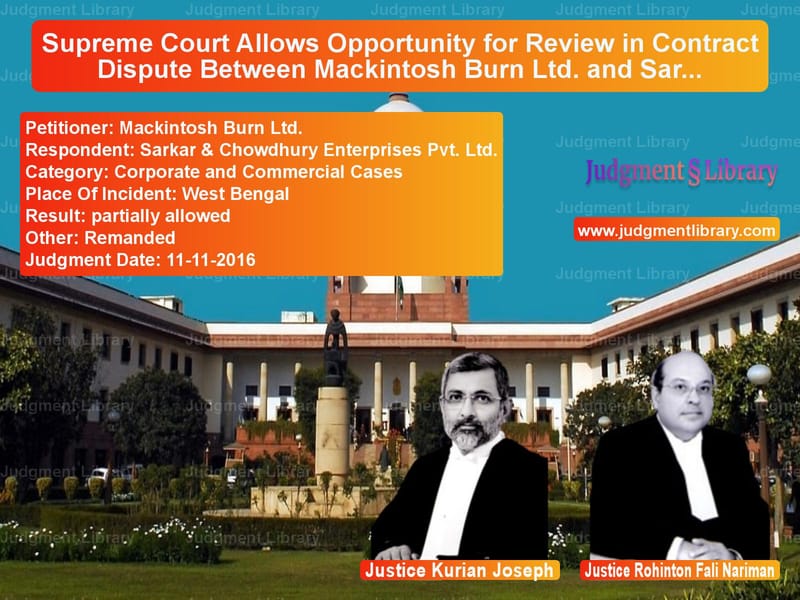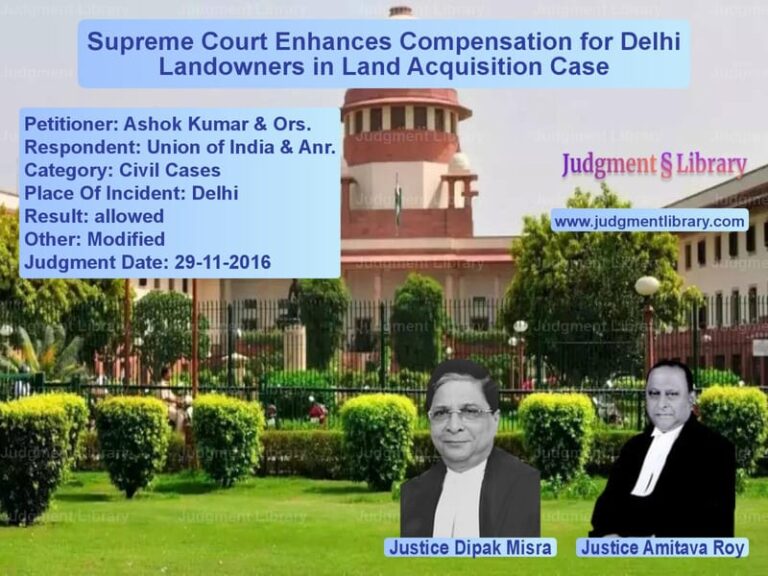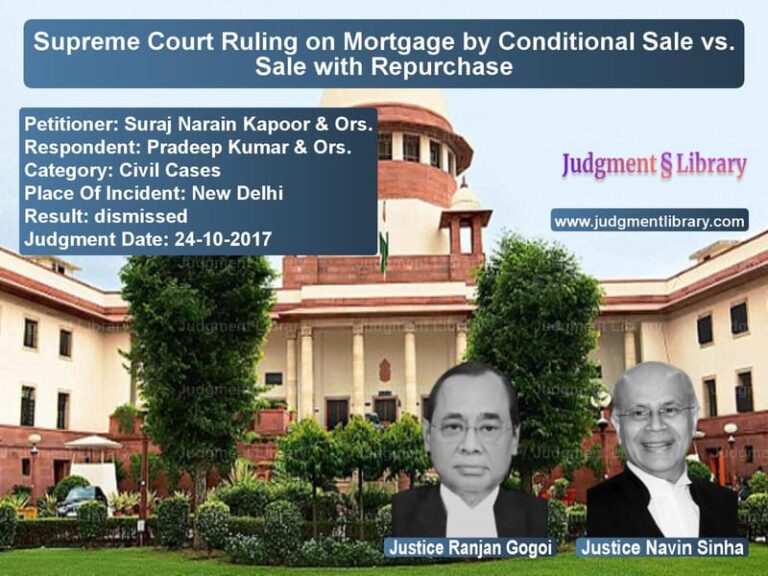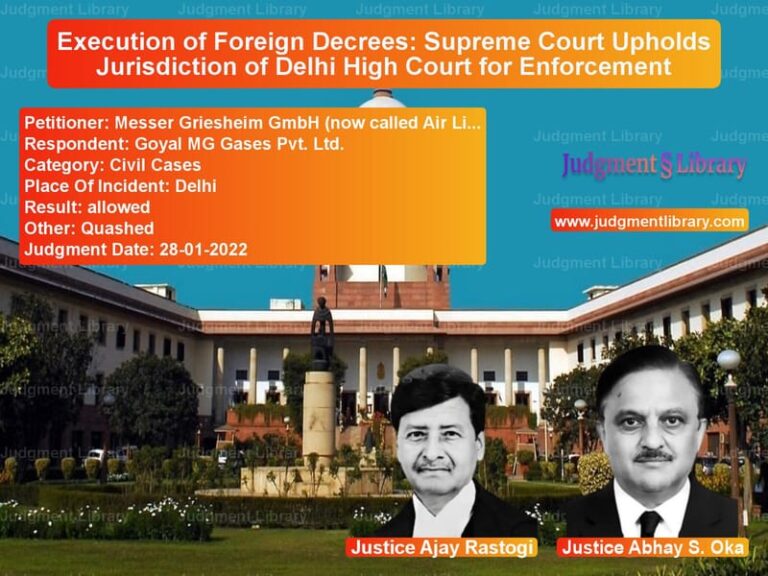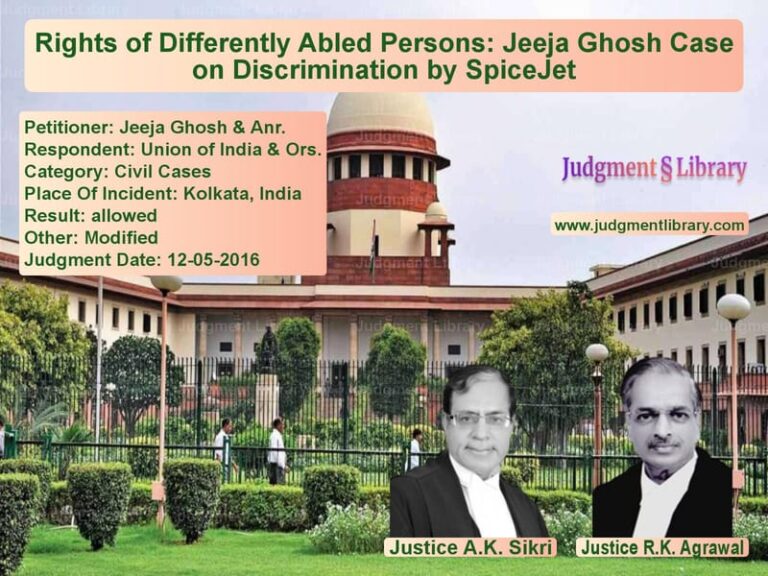Supreme Court Allows Opportunity for Review in Contract Dispute Between Mackintosh Burn Ltd. and Sarkar & Chowdhury Enterprises
The case of Mackintosh Burn Ltd. vs. Sarkar & Chowdhury Enterprises Pvt. Ltd. is a significant Supreme Court ruling delivered on November 11, 2016. This judgment revolves around a contractual dispute and the procedural rights of a party seeking reconsideration of an earlier High Court decision. The Supreme Court granted the appellant, Mackintosh Burn Ltd., an opportunity to file a review petition before the High Court instead of directly seeking relief from the Supreme Court.
Background of the Case
The dispute arose when Mackintosh Burn Ltd. approached the Supreme Court after an adverse order from the High Court. Earlier, on January 4, 2016, in Special Leave Petition (C) No. 35029/2015, the Supreme Court had permitted the petitioner to withdraw the special leave petition with the liberty to approach the High Court.
However, when Mackintosh Burn Ltd. returned to the High Court, it did not file a review petition but instead sought a fresh hearing of the appeal itself. The High Court rejected this approach, prompting the appellant to return to the Supreme Court seeking redress.
Key Legal Issues Considered
- Was Mackintosh Burn Ltd. correct in seeking a fresh hearing instead of filing a review petition?
- Did the High Court have the discretion to dismiss the matter outright?
- Should the Supreme Court intervene to provide another opportunity for review?
Arguments Presented
Appellant’s (Mackintosh Burn Ltd.) Arguments:
- The appellant misunderstood the procedural requirement and instead of filing a review, attempted to reopen the appeal.
- The High Court’s rejection of their request without considering the merits of the case was unfair.
- The appellant should be granted one final opportunity to properly present their case through a review petition.
Respondent’s (Sarkar & Chowdhury Enterprises Pvt. Ltd.) Arguments:
- The appellant had already been given the liberty to approach the High Court but failed to follow the proper procedure.
- The High Court was justified in rejecting an attempt to rehear the appeal instead of following review procedures.
- The case should not be reopened further, as this would lead to unnecessary delays.
Supreme Court’s Observations
The Supreme Court acknowledged that Mackintosh Burn Ltd. had taken an incorrect procedural approach in the High Court but recognized that the matter had not been adjudicated on its merits. The Court ruled:
“Once a party is permitted to go back to the High Court, the High Court can be approached only by way of a review petition and therefore, there is no basis for the unreasonable stand taken in the High Court for not filing a review petition.”
The Supreme Court further noted:
- The appellant’s failure to file a review petition was a procedural error, but it should not result in a complete denial of relief.
- Since the review petition had not been filed in time, the Court was inclined to grant one more opportunity for the appellant.
- The review petition, if filed within two weeks from the date of judgment, should not be dismissed on grounds of delay.
Final Judgment
The Supreme Court ruled:
- The appeal was disposed of with a direction allowing the appellant to file a review petition.
- The High Court was directed not to dismiss the review petition on the ground of delay if it was filed within two weeks.
- The matter was remitted back to the High Court for fresh consideration through proper procedural channels.
- No costs were imposed on either party.
Impact of the Judgment
The ruling has significant implications:
- It clarifies that when the Supreme Court grants liberty to approach the High Court, it must be exercised in accordance with procedural rules.
- It ensures that parties are not unfairly deprived of legal remedies due to procedural misunderstandings.
- It reinforces the importance of review petitions as a mechanism for reconsidering High Court decisions.
- It prevents procedural technicalities from becoming an obstacle to substantive justice.
Conclusion
The Supreme Court’s decision in Mackintosh Burn Ltd. vs. Sarkar & Chowdhury Enterprises Pvt. Ltd. serves as an essential precedent in contract disputes where procedural missteps occur. By allowing Mackintosh Burn Ltd. another opportunity to seek a review of the High Court’s decision, the judgment upholds the principle that procedural lapses should not unfairly deprive a party of justice. This ruling ensures that legal remedies remain accessible while maintaining procedural discipline.
Don’t miss out on the full details! Download the complete judgment in PDF format below and gain valuable insights instantly!
Download Judgment: Mackintosh Burn Ltd. vs Sarkar & Chowdhury E Supreme Court of India Judgment Dated 11-11-2016.pdf
Direct Downlaod Judgment: Direct downlaod this Judgment
See all petitions in Contract Disputes
See all petitions in Corporate Compliance
See all petitions in Bankruptcy and Insolvency
See all petitions in Judgment by Kurian Joseph
See all petitions in Judgment by Rohinton Fali Nariman
See all petitions in partially allowed
See all petitions in Remanded
See all petitions in supreme court of India judgments November 2016
See all petitions in 2016 judgments
See all posts in Corporate and Commercial Cases Category
See all allowed petitions in Corporate and Commercial Cases Category
See all Dismissed petitions in Corporate and Commercial Cases Category
See all partially allowed petitions in Corporate and Commercial Cases Category

